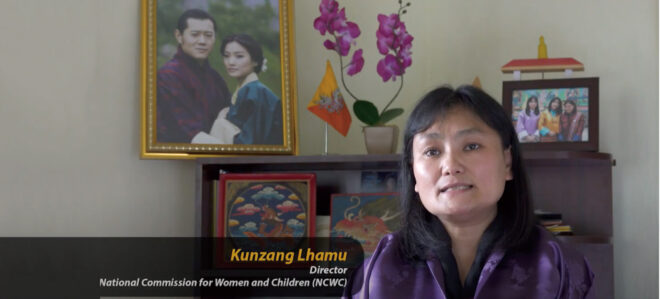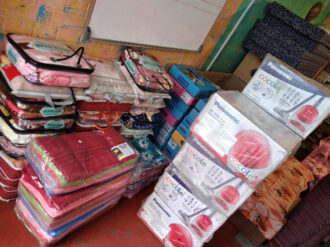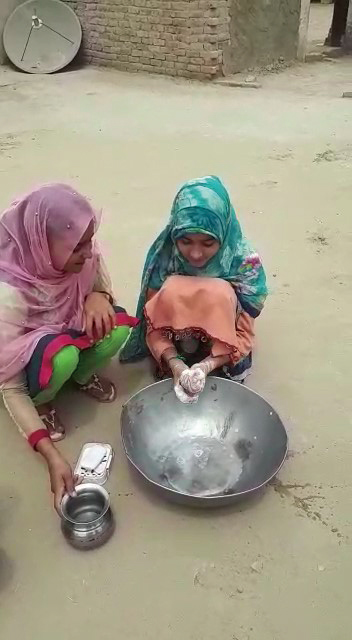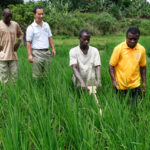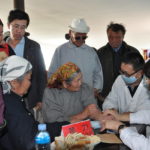The Japan International Cooperation Agency (JICA) is implementing a range of infection control support measures against COVID-19 in developing countries. We take a look at some of these measures, with a focus on the policies being implemented to counter the risks and exacerbated disadvantages that women and girls face as a result of the spread of COVID-19.
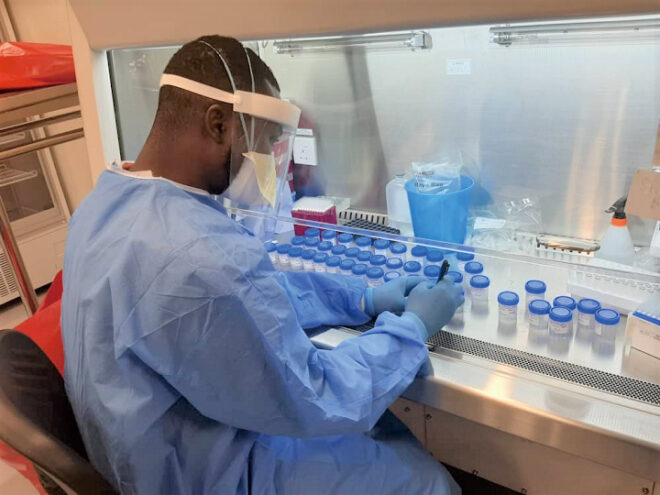
A former participant of a JICA training program in Japan performs preparatory work for PCR testing at the Noguchi Memorial Institute for Medical Research (NMIMR) in Ghana. COURTESY OF JICA
The novel coronavirus (COVID-19) is raging across the world. The number of infected rapidly started increasing globally around February 2020, and according to the calculations of the Johns Hopkins University in the United States, there were about 11 million officially confirmed cases and about 530,000 dead in the world as of July 6.
The spread of COVID-19 is dealing serious blows to countries’ societies and economies. Amid this, the Japan International Cooperation Agency (JICA) is implementing infection control support against COVID-19 in developing countries. In Vietnam, where the Project for Capacity Development for Medical Laboratory Network on Biosafety and Examination of Highly Hazardous Infectious Pathogens has been running since 2017, reagents used in tests to identify COVID-19 have been provided to the project counterpart National Institute of Hygiene and Epidemiology in February. In Mongolia, where the Project for Strengthening Post-graduate Training for Health Professionals in Primary and Secondary Level Health Facilities has been running since 2015, coveralls, caps, medical gloves, and other personal protective equipment have been provided to the project counterpart Ministry of Health also in February.
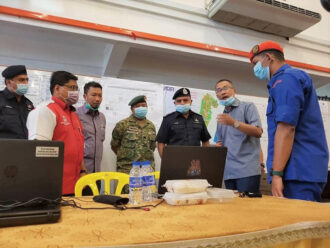
A graduate of the Malaysia–Japan International Institute of Technology (MJIIT) (far right) briefs policemen and local government officials on the spread of COVID-19. COURTESY OF JICA
Additionally, ex-participants of JICA’s training programs in Japan and facilities that have received support from Japan for many years are making major contributions to infection control. Since its establishment with Japanese help in 1979, the Noguchi Memorial Institute for Medical Research (NMIMR) in Ghana has been a site of various forms of Japanese assistance, including the training of human resources and facility development, and is currently an infection control hub not just for Ghana but for West Africa. As regards COVID-19 measures, the NMIMR also handles most of the PCR testing in Ghana and ex-participants of training programs are conducting tests every day.
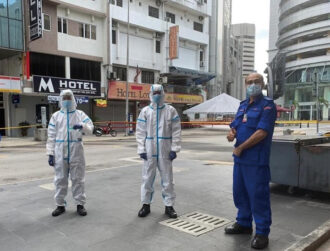
A graduate of the Malaysia–Japan International Institute of Technology (MJIIT) (far right) working on the front lines to assist people infected with the novel coronavirus COURTESY OF JICA
The Malaysia–Japan International Institute of Technology (MJIIT), established with Japanese support as an academic institution of Universiti Teknologi Malaysia in 2011, offers the Master of Disaster Risk Management Program, with program graduates and students using their knowledge about disaster management and public health that they have acquired at the program to help stop the spread of COVID-19. Moreover, MJIIT academic and technical staff and students are working together to develop, produce, and donate to local hospitals aerosol boxes, which protect medical practitioners from droplet infection while being able to conduct endotracheal intubations and other measures, and droplet-blocking face shields designed with 3D printers.
JICA has started working with external experts in initiatives to contribute to infection control measures in developing countries through comparative and practical research on COVID-19 measures in different countries. A first stage of this was announced on June 18 as “To Our Friends and Partners Fighting Against COVID-19 in Developing Countries,” which gathers an analysis of the current situation based on information from different countries, a provisional discussion that combines international comparisons, and JICA’s three commitments (see table).
COVID-19 as a Threat against Gender Equality
There are growing concerns around the world that COVID-19 may wipe out gains in gender equality and poverty reduction that societies have achieved until now. On April 9, UN Secretary-General António Guterres delivered a video message in connection with the announcement of “Policy Brief: The impact of COVID-19 on women.” He stated, “The COVID-19 pandemic affects everyone, everywhere. But it affects different groups of people differently, deepening existing inequalities. Early data indicates that the mortality rates from COVID-19 may be higher for men. But the pandemic is having devastating social and economic consequences for women and girls.” He then said, “I urge governments to put women and girls at the center of their efforts to recover from COVID-19.”
In many societies, women find themselves in an unequal and disadvantaged position in terms of education, employment, and various other factors simply for being women. Aiming to eliminate the inequality and disparities between men and women, the international community has adopted treaties such as the Convention on the Elimination of all Forms of Discrimination against Women, while individual countries have worked to reform laws and implement them. However, gender inequality still remains a big challenge for the world.
Kamei Haruko, senior director of the Office for Gender Equality and Poverty Reduction at JICA, says, “The COVID-19 crisis, like disasters and conflicts, is bringing devastating negative impacts to individuals in countries across the world. Risks are increasing for women, the poor, minorities, and other people in vulnerable positions.”
The following five are major risks faced by women and girls as COVID-19 spreads.
(1) More Sexual and Gender-Based Violence (SGBV)
Sexual and gender-based violence (SGBV), which signifies domestic violence (DV), sexual harassment and exploitation, rape, and so forth, not only violates the dignity of individuals but also leads to big economic losses. UN estimates in 2016 suggest that those losses are as much as 1.5 trillion US dollars annually for the whole world. According to the UN, the spread of COVID-19 and the concomitant lockdowns in many countries have led to a global rise in SGBV, centering on DV from husbands, partners, and family members. The lockdown prevents victims from evading the monitoring of the perpetrators and limits support from the authorities and private organizations, which means that victims of SGBV find themselves in extremely difficult situations.
(2) Threats to Sexual and Reproductive Health and Rights (SRHR)
As a result of the resources of the healthcare and medical system being mobilized against COVID-19, there has been an increased burden in providing essential services for protecting sexual and reproductive health and rights (SRHR), such as maternity healthcare services, medical care for SGBV victims, HIV testing services, and sales and distribution of contraceptives. There is concern that the greater demand for testing and safe abortion due to the increase in SGBV will not be met properly, thus leading to more unintended pregnancies and deepening financial burdens and poverty for women.
(3) Securing the Safety and Needs of Female Medical Workers
According to “Gender equality in the health workforce” that was presented by the WHO in March 2019, 70% of the world’s healthcare and medical workers (doctors, nurses, midwives, public health nurses, etc.) are women. Moreover, the majority of workers providing services such as cleaning, laundry, and catering at medical facilities are also women. As such, women have a greater risk of being exposed to COVID-19. In fact, 72% of infected healthcare and medical practitioners in Spain and 66% in Italy have been women.
(4) Impacts on Women’s Employment and Livelihoods due to Economic Dislocation
Around the world, women have lower incomes and fewer savings than men as well as work unstable jobs. The proportion working in the informal sector is also big. According to “Women and Men in the Informal Economy” that was presented by the International Labour Organization in 2018, more women than men are in the informal labor market in low- and middle-income countries. For example, 90% of working women in Africa are employed in the informal sector, while it is 83% for men. The proportion with access to social security and financial services is also low for women compared to men. As such, the economic blow of COVID-19 is predicted to hit women harder.
(5) Heavier Unpaid Care Workload, Digital Gender Gap, and Deprived Educational Opportunities
In normal times, there is great inequality in the division of unpaid care work among men and women. With the spread of COVID-19 lockdowns, unpaid care work, such as care of infected persons staying at home, child learning support, and elderly care, places a big burden on women. The spread of lockdowns is having the effect of expanding various services such as telecommuting and online education, but there is a digital gender gap when it comes to access to ICT technologies and the Internet. An expansion of ICT technologies without resolving these disparities may only exacerbate the disparities more. Moreover, since it is common for women and girls to do unpaid care work such as securing food, water, and fuel in developing countries, it is predicted that women and girls’ learning at home will stagnate compared to men and boys, depriving them of opportunities that cannot be reclaimed.
Protecting Women from COVID-19
In order to avoid the disadvantages women and girls face and mitigate negative impacts on gender equality caused by the spread of COVID-19, JICA has worked out the following policies. Firstly, when planning, formulating, and implementing projects, gender disaggregated data will be obtained and analyzed to design activities and support from a gender perspective. It is necessary to understand the circumstances and needs of women and girls as well as the current situation and causes of gender disparities in order to provide appropriate support. Secondly, women should participate in decision-making and their leadership be promoted. In the past, women’s opinions have not been sufficiently heard and reflected when formulating and implementing measures in crisis situations and restoration plans, which has had the result that women’s needs have fallen to the wayside so that many measures and plans have been inadequate.
Kamei says, “Achieving gender equality leads to realizing the ideals of ‘human security’ and ‘none will be left behind’ of the sustainable development goals (SDGs). Therefore, we should take steps to mitigate negative impacts on gender equality and poverty reduction by the spread of COVID-19.”
JICA is already providing support from a gender perspective in response to COVID-19. One example is the broadcasting of a DV prevention public awareness movie in Bhutan. JICA ran a project titled Capacity Building of Government Officials and Rural Women on Gender Mainstreaming and Empowerment of Women from 2016 to 2018 with the National Commission for Women and Children (NCWC) as its counterpart. Moreover, the Knowledge Co-creation Program (country-focused) on “Gender Mainstreaming, Women’s Empowerment, Child Well-being, and Child Rights” started in 2019. As COVID-19 was spreading across the world in March 2020, the JICA Bhutan office and the NCWC discussed and decided to broadcast a DV prevention public awareness movie to avoid the increased risks of DV between spouses and other forms of violence at home that come with disasters and other emergency situations. Following negotiations with the national broadcasting station and preparations such as creating the message over a number of days, the movie was broadcast nationwide.
Furthermore, materials and equipment for improving hygienic conditions, such as bedding, washing machines, and vacuum cleaners, were distributed to day nurseries. Moreover, four types of posters were made sharing basic knowledge about and preventive methods against COVID-19 such as hand washing with the aim of making habits of appropriate infection prevention measures at day nurseries and at home.
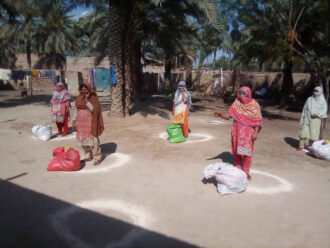
In Sindh Province, Pakistan, village women’s groups helped to coordinate social distancing before emergency supplies were handed out. COURTESY OF JICA
In Pakistan, where the Project for Improvement of Livelihood and Well-being of Female Home Based Workers in the Informal Economic Sector in Sindh Province has been running since 2017, support measures against COVID-19 have likewise been implemented. As part of the project, pilot activities aiming to improve life skills, promote financial access, and increase income have begun through ten women’s groups in the farm village area of northern Sindh Province, but because of the spread of COVID-19 since March 2020, a lockdown was imposed and many lost their sources of income in the project area. The situation was exacerbated due to the decrease or total loss of people’s incomes, the closure of shops, and difficulties acquiring food and other daily necessities. In response to such a dire situation, project experts and philanthropists made donations to provide emergency relief by distributing food and daily necessities. Local staff collected information through the village women about their needs and handed out ration bags containing rice, flour, beans, oil, soap, and other necessities to about 230 households (1,750 persons in total) on a total of three occasions.
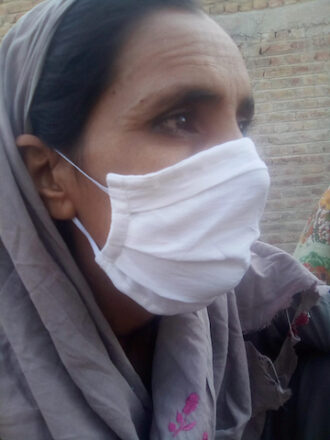
In Sindh Province, women’s groups made face masks in response to the spread of COVID-19. COURTESY OF JICA
Making the most of these emergency relief occasions, public awareness was raised about basic knowledge for preventing COVID-19 infections, such as hand washing and social distancing. Moreover, as a part of this project, technical guidance and marketing support for handicrafts were provided to support women’s incomes. However, the spread of COVID-19 closed down previous markets for selling products and deprived them of income opportunities. Therefore, instead of relying on previous product lines and marketing measures, they started manufacturing face masks to be sold on-line and other potential markets for which there is an increasing demand.
Besides this, in Thailand, where the Project on Strengthening of Multi-Disciplinary Teams (MDTs) for Protection of Trafficked Persons in Thailand from 2009 to 2014 and the project Capacity Development on Assisting Victims of Trafficking in the Greater Mekong Sub-regional Countries from 2015 to 2019 were implemented, insights gained from the projects and networks have been used to plan a pilot project relating to child protection and the prevention of sexual and gender-based violence (SGBV).
“The crisis brought by spread of COVID-19 reveals the various gender-related social problems deeply rooted in our societies,” says Kamei. “SGBV is a human rights violation as well as a cause of great social and economic losses. For the last couple of years, we have been strengthening our initiatives to eliminate SGBV, and this commitment has only become stronger with the spread of COVID-19.”
SAWAJI Osamu, The Japan Journal
Note; This article first appeared in the July/August 2020 issue of the Japan Journal.


